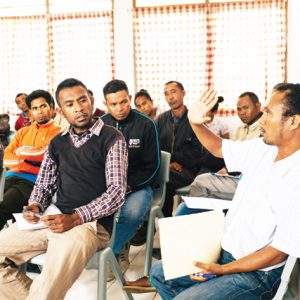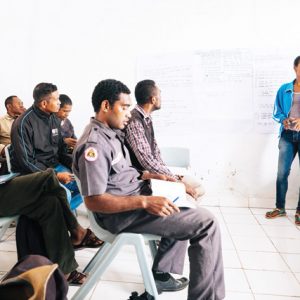“In Timor-Leste, marriage and funeral ceremonies can cost families a lot of money. Sometimes, their entire yearly earnings,” said Laurensius Lein, a conflict prevention and policy specialist for Belun, a Timorese NGO.
But it is not just the immediate family that has to pay, he explained. It is custom for the extended family, and the local community, to contribute money, goods or even cattle, which are killed and eaten during the ceremonies. “We have had cases where each extended family is expected to offer ten cattle, and each cow can cost up to $500,” adds Lein, shaking his head.
To put this into context, another national NGO, La’o Hamutuk, estimates that the average monthly income per person in rural areas, where the majority of the Timorese people live, is less than $50.
“If someone cannot afford what is asked of them, there could be fighting during the ceremony. Or they could have a spell put on them that will bring them bad luck or death in the future,” Lein continued. “We make our lives poor because of these ceremonies. A family will spend all their money and even have to take loans, and then they say there is no money to send their children to school, afford decent healthcare and start to make savings.”
This would be a problem in any country. But in Timor-Leste, where La’o Hamutuk estimates that more than half the population lives in poverty and that 41% of working-age citizens are unemployed, this is a major issue.
That is why, on a cold morning in April, about 20 men and women gathered outside a community centre in the small town of Maubisse, high in the tropical forests and a 70-kilometre drive south of the capital, Dili. For more than an hour they huddled by a pickup in thick overcoats, dragging intensely on cheap, Indonesian cigarettes.
“They are the xefes du suku [village leaders] and administrators for the sub-district,” explained Lein, who had come on behalf of Belun to assist with the meeting.
As the crowd took their seats, Adelino Espirito Santo, the cultural coordinator for the Maubisse sub-district, explained that the attendees would discuss imposing a limit on the amount of money that can be spent on marriage and funeral ceremonies – as well as the ceremony practised after the building of a traditional house – by using a centuries-old custom called tara bandu.

A joint report by Belun and the Asia Foundation in 2013, after an eight-month study, defined tara bandu as a “traditional Timorese custom that enforces peace and reconciliation through the power of public agreement to define social norms and practices to a given community”.
Tara bandu serves as an integral part of what is called lisan, a Timorese concept that defines social norms, morality, rituals and systems of community governance. Although opinions differ, tara bandu can be simplified as a system of local rules set by different communities. For example, it could limit how many trees are cut down in an area, settle cases of theft or even deal with domestic violence.
However, tara bandu is not a nationwide set of rules. Instead, each district, sub-district or even suku (collection of villages) might have its own distinct tara bandu. In Metinaro, a city in Dili district, stealing an animal requires the repayment of the same animal as punishment. While in Maubisse, one village leader told Southeast Asia Globe: “If someone steals a cow in my community, we say the thief has to repay one cow and sacrifice another for the community.”
Although tara bandu has existed for centuries, pre-dating Portuguese colonisation in the 16th Century, the Belun-Asia Foundation report claims that it has enjoyed a “resurgence” since Timor-Leste gained independence in 2002. Today, organisations including Belun, the Asia Foundation and USAID, as well as the government, support using tara bandu as a means of conflict prevention, poverty reduction and social cohesion.
“As practiced today, tara bandu often falls into three categories: regulations on human interactions with the environment, interactions with each other and interactions with animals,” said Todd Wassel, deputy country representative in Timor-Leste for the Asia Foundation and an author of the report. “It is generally perceived to prevent violent conflict and, as our report shows, when there is a tara bandu, people are calmer and more at ease.”
During the 2012 parliamentary election, Belun supported the Tutuala sub-district, located on the easternmost tip of the island, in the formation of a tara bandu to prohibit “aggressive political language” – something that, in the past, had stoked conflict in a country that was marked by political and regional divisions.
The government has occasionally supported tara bandu as well. In 2012, the Ministry of Agriculture and Fisheries worked with village leaders in Daudere, in the east of the country, to introduce a tara bandu to restrict the cutting down of trees in a certain area in order to enable reforestation. In fact, according to the report, the former minister of justice, Dionisio Babo, expressed his support for tara bandu by stating that “customary practices can strengthen formal laws”.

“For human relations to the environment, tara bandu very much helps to reinforce a lot of the laws of the state, such as preventing degradation and allowing reforestation,” said Wassel. However, he added that this is not always so clear in other areas of the law and that, often, tara bandu and the formal justice system can be quite separate.
Later in the day, outside the Maubisse community centre, a village leader put it this way: “Many local people do not trust [formal] law and courts. We are used to settling matters locally, as we have done for centuries.”
Research by Belun has revealed similar views of the formal justice system in other rural areas of Timor-Leste. In one case, a local community claimed that $7,500 had been “wasted on a case” going to court, whereas it could have been settled for $200 through tara bandu.
However, concerns have been raised that, instead of supporting the rule of law, tara bandu could actually be undermining it. One particular area of concern is domestic violence. A 2010 demographic and health survey, carried out by the government, found that 36% of married women reported being victims of incidents of physical, sexual or emotional violence by their husbands.
“While a number of advantages of an informal justice system can be identified, [studies] point out that [these] mechanisms display serious shortcoming for female victims of domestic violence seeking access to justice,” stated a 2011 report by the UN Development Programme (UNDP) titled Customary Law and Domestic Violence in Timor-Leste.
The UNDP report states that during local mediation there have been occasions when the emphasis has been put on “the woman’s behaviour that might have caused the violence, such as not cooking a meal, or failure to prioritise her responsibilities as a wife or mother”.
Timor-Leste’s penal code of 2009 designates domestic violence as a “public crime” that must be investigated and prosecuted by the state regardless of whether the victim has filed a complaint. But this is not always the case. In 2010, a judge in the southern city of Same closed a domestic violence case after the victim and perpetrator presented a peace agreement produced using tara bandu.
Furthermore, as is so often the case, there are no statistics for the number of domestic violence cases that fail to make it into the formal justice system and are instead dealt with locally. But as the UNDP report claims, if domestic violence is dealt with locally, then the female victims may not be able to access justice due to the “minimal and often superficial” participation of women in the decision-making positions of communities. However, Maria de Silva, a 24-year-old youth group worker in Maubisse, disagrees that women are not always part of the decision-making process of tara bandu. During the Maubisse meeting, the older men listened when she voiced her opinion, and after a brainstorming session she eagerly grabbed the felt-tip pen and lectured the others for 20 minutes about her group’s thoughts.
“Tara bandu is, of course, important for women,” she says, alternating between rudimentary English and Tetun, the Timorese language. Yet, she adds, she has never been made to feel excluded in her community and during discussions with the sub-district.
Wassel admits that tara bandu is not perfect, and improvements must and are being made, which is why numerous national and international NGOs are keen to offer their support to local communities. “In the future, the work will be around how to protect the human rights and civil liberties of the people living in tara bandu-regulated areas … and ensuring that the voices of women, the disabled and other marginalised peoples are heard,” he said. “But tara bandu is an integral part of the Timorese culture that will last for quite a long time”.
Lein echoes such an opinion. Speaking a few days after the Maubisse meeting, he was optimistic that the village leaders and sub-district administrators had agreed to introduce a limit the expenses for wedding, funeral and traditional house ceremonies of between $150 and $200. “Five people will write it down, check it against the Timor-Leste constitution and laws and then produce a presentation for the sub-district,” he said.
In an increasingly globalised world, despite certain drawbacks, customs such as tara bandu can offer a rare moment of community democracy. As one village chief said: “Tara bandu is our history. I hope it will be our future too.”


